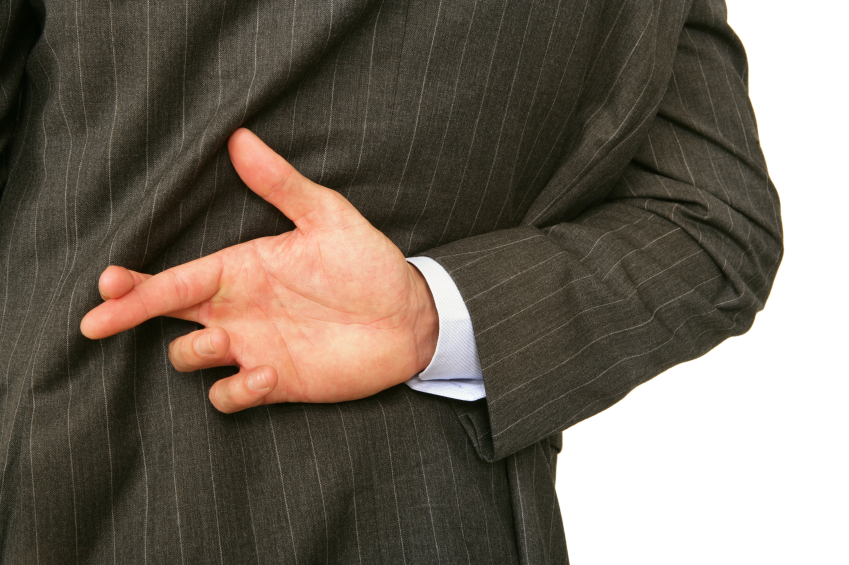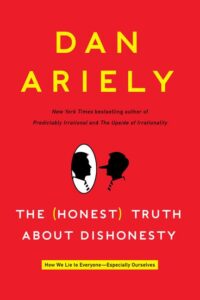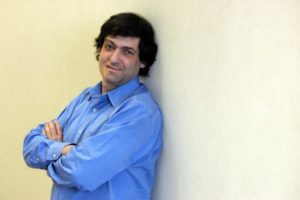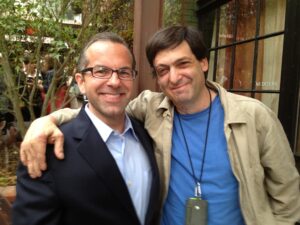The New York Times bestselling author Dan Ariely has a new book, The (Honest) Truth About Dishonesty. As a fan of his previous books Predictably Irrational and The Upside of Irrationality, I was excited to delve into his new area of research. That new area of research is all about dishonesty, and I guarantee you that it will open your eyes.
It’s easy in today’s society to point to others who are unethical or liars. Watch the news and you can’t miss the new corporate scandal or some form of corruption in government.
Dan’s research shows why we may think it’s okay to lie or cheat. It shows how one lie can build into another, and affect others around us. It shows that none of us can claim perfect honesty. The research then shows what we can do to improve honesty for ourselves and our culture.
About Dan Ariely
Dan Ariely is a Professor of Psychology and Behavioral Economics at Duke University. He holds two PhDs, one in business administration and the other in cognitive psychology. His work has been featured in numerous publications from The New York Times to The Wall Street Journal. He has also been a keynote speaker for TEDTalks.
What sparked your interest in dishonesty?
I first became interested in dishonesty after Enron. And the basic question that I asked myself at that point was, what’s a better description of the Enron catastrophe—is it that there are a few bad apples who plan and execute and create some terrible, economic devastation, or is it better described by lots of wishful blindness that is created by lots of sort-of good people.
And the reason I thought this is an important question is because dealing with these two very different types of dishonesty is very, very different. If you think that dishonesty is mostly created by bad apples, then you basically want to change hiring procedures and make sure you won’t hire bad apples.
But if you think many of us are capable of behaving like bad apples, that many of us are capable of wishful blindness and negative—very negative—behaviors, then we need to think very differently about the barriers, the causes, and what we can do about dishonesty.
Is “a little dishonesty” universal? Or have you identified any group or groups who tend to be significantly more or less dishonest than the average?
In general, I’ve been asking people this question a lot. I’ve talked in all types of places, and I always ask people if they grew up in a different country, whether in their country of origin people cheat more or less than Americans. With the exceptions of Canadians and Scandinavians, usually people think that in their origin country, people cheat more than the Americans. The Americans are actually quite honest. But when we do our experiments, we actually don’t find these large differences. When we do our experiments—we haven’t done them in every country, but we’ve done them in Israel, China, Turkey, Canada, England, and Italy—and so far we haven’t found these differences. Basically, what I believe right now is that people have a similar “fudge factor” that is universal. It is something like our basic belief. It’s almost like the visual system—it’s rather consistent across people and cultures. But on top of that, there’s also cultural influence, and some cultures take some activities—let’s say cheating on exams, using illegal software, all kinds of things—and move their tolerance to that particular activity. So when we did our experiments with a new experience detached from any moral culture, we don’t see any big differences, but when we deal with something that has a specific cultural baggage, then we do see cultural differences.
Did you confront any of your experimental groups with your results, especially those groups that cheated the most? If so, what percentage of the people “came clean”? And what percentage rationalized their behavior?
In general I don’t come clean to people. I give people a chance to steal money from me and I don’t come back to them and say, “Hey, you just stole!” And this is a question about how we do experiments and how we want people to deal with it, and so on. I basically chose so far not to confront people with this, but I suspect most people rationalize their own behavior very quickly, and I think there are many paths to rationalize behavior. You can say to yourself, “Aw, this is a rich university, we’re just taking money from them,” or you can say, “I really knew more answers, I just didn’t try as hard.” Or you can say, “Everybody’s doing it.” There are lots of paths to rationalization, and I think that people take different paths, but people do take these rationalization paths. And, of course, I myself—I’m no different in my ability to rationalize. It’s an incredibly human quality that in many cases has some fantastic benefits, but it also has some downsides.
Just as a little bit of smoking almost always leads to years of smoking, your research indicates that a little bit of dishonesty leads to ongoing, frequent dishonesty. What are some actions we can take to nip dishonesty in the bud?
In my mind, the first thing to do is to realize that this is the trend. We often think that oh, it’s just one act and it doesn’t really matter, and this person is really quite honest, and they’re a celebrity or politician or whatever it is, and let’s just forgive them because it’s one little act. What we don’t understand is that one little act creates a tendency for that individual to create more acts, and it also creates the possibility that other people would watch them and then find those activities to be more moral. So, when people act dishonestly, they don’t only corrupt themselves, but they basically corrupt the people around them, which of course is also very dangerous.
The first thing we need to do is to understand this downside and understand that dishonesty has this slippery slope nature. So we need to cut things early, we need to be not as forgiving for early signs of dishonesty, because those are the most important ones to be strict with and prevent from deteriorating. It also means we need to find some mechanisms for resetting peoples’ moral standard. So if you think about the slippery slope, you know, you start on a diet and then you eat a muffin, and say, “Ah, what the hell . . . I might as well continue eating badly for the rest of the day,” and with honesty, if you behave once dishonestly, there’s no reason for you to start behaving nicely after that—or ethically after that.
Unless we have this resetting mechanism that stops people, and says “okay you thought of yourself as this honest person, and you behaved in this slippery slope approach, but let’s stop it now, let’s reset and start again.” And I think this is what many religious ceremonies—like Catholic confession or Jewish Yom Kippur— are basically doing in terms of resetting people’s moral standards, and I think we need to do more of those in our day-to-day activities.
You write about an experiment showing our impulsive system takes over when the brain is overloaded. Comment about the link between dishonesty and exhaustion.
So, exhaustion here is mental exhaustion, and not physical exhaustion. The idea is that there’s this central capacity we call “willpower,” which is our ability to fight temptation. And we face temptation all day long. We face temptation in the social domain, temptation in terms of not checking Facebook all the time. We face temptation in terms of eating. We face temptations all day long. And the finding is, that as we face more and more temptations, we get more and more what is called “depleted.” We find it harder and harder to resist future temptations. So the very act of resisting temptation is a little bit like lifting a weight. Every time we do it more and more, we get more and more tired, until at some point, we fall to temptation.
And what is interesting here is that honesty is one of those things that react with mental exhaustion or depletion. We show that once we get people to try to resist temptation in other domains completely unrelated to dishonesty, all of a sudden they find it harder to resist the temptation of being dishonest, and as a consequence, they cheat to a higher degree.
And it means, for example, that if you have some moral task later in the day when you are depleted and exhausted, there’s a greater chance you would be less moral compared to something you do earlier in the day before you are depleted. And the prescription there, I think, is quite simple: let’s take the task we think is more important, and let’s try to prevent ourselves from doing them in situations and conditions where we are depleted.
Can you expand on your discussion of “resetting ceremonies” to help people get back to honest behavior?
This I think is one of the big lessons from religion. We look at religion as something that was given to us by God, but we can also look at the wisdom of religion as a mechanism that is trying to curb human instinct. We can say, look what is happening with religion. It is basically a mechanism that has evolved over time to help people fight with some of our very basic, damaging instincts to ourselves and to our society. And, ceremonies like the Catholic confession look incredibly strange from the beginning, especially from an economic perspective. If you’re an economist and you look at Catholic confession, you would say, “Hey, if I can sin and be forgiven, I should sin more. In fact, if my only purpose is not to go to hell and not to go to purgatory, then what I should do is I should cheat on the way to confession and quickly go to confession so I don’t die without a confession.” But of course, that’s kind of the rational perspective and it’s not the right perspective to take about confession. When we do experiments on confession, what we find is that these resetting ceremonies help people get over what’s called the “what the hell” effect. So imagine you start sinning. At some point you sin too much and you think, “You know what? I’m a sinner. If I’m a sinner, I might as well live like a sinner because it’s a really interesting or exciting life, and I’m not going to get to heaven anyway. I’m going to hell. I might as well enjoy my life.”
And then the religious ceremonies come to help us, and say okay, let’s reset it and start from scratch. And I actually think—first of all, we find in our brief experiments that these mechanisms work quite well—that what we need to do is to think about how we adopt these mechanisms outside of religious life. What would Congress look like if we allowed Congress people to absolve themselves from time to time, repent, and ask forgiveness? What would Wall Street look like if we did that? What would universities and students and classes look like if we did it? I think all those institutions would benefit from some religious-like resetting ceremony that would help us kind of stop the slippery slope and reset our standards and start fresh.
Would you recommend exposing and fighting rationalization as a productive way to reduce dishonesty?
Absolutely, yes. There is one view of dishonesty that it comes out of cost benefit analysis. How much do I stand to gain from this dishonesty? What do I stand to lose if I’ll be caught? But, what we find is that this is not a very good descriptor of the causes for dishonesty. Instead, what we do is we cheat up to the level that we can rationalize. If we file our taxes and we can rationalize one extra dinner with a friend as a business expense, we will do that. If we can rationalize three of them, we’ll indicate that, and if we can rationalize five, we would add a few more. So it’s basically rationalization that is helping us to do things that are not on the up and up, but we feel okay with them because we’ve been able to rationalize them. So, to the extent that we can eliminate or at least reduce rationalization, we would radically reduce the extent of dishonesty we see in society.
Now this is not going to be easy because people are creative, and we have all kinds of ways to rationalize. But, at the same time, I think we need to at least create systems that don’t allow people to rationalize. So think to yourself about how easy it is to rationalize back-dating stock options. I think it is so easy to rationalize because there are so many stories you can tell yourself. Or how easy it is to rationalize over-charging things on expense reports compared to embezzling directly from a petty cash box? Every time that something has potential stories to it, there’s a good chance that people would step out of bound and would behave dishonestly.
Dishonesty is an interesting subset of your broader research on human irrationality. What themes from your earlier books also apply to the subject of dishonest behavior?
For me, dishonesty is interesting by itself. It’s one example of human irrationality. It’s also incredibly important, because I think that dishonesty was the main cause for the financial crisis, for example. And if we don’t understand exactly how the financial crisis was created from the perspective of dishonesty, we would not figure out how to deal with it so it doesn’t happen again. So I think it’s incredibly important to study on its own, but at the same time, it’s just one example of irrational behavior. Like many other irrational behaviors, it shares some basic features, which is that we have naive beliefs. Naive beliefs about how people work and what causes people to behave a certain way, but this naive belief is not what is actually causing us to behave. So we have this naive belief that people act as a rational agent and they do a cost benefit analysis, and it turns out this is not what really causes dishonest behavior. And not only that, it turns out we are unable to truly recognize the forces that truly change our dishonest behavior. So, for example, when we get people to cheat for something that is not money but one step removed from money, people cheat to a higher degree—to a much higher degree—but we don’t predict that. We don’t think that, oh, the moment we move from money to stocks, people would cheat much less. But the fact is, people do.
So, I think, it’s important by itself, but then on top of that it has all the characteristics of standard human biases and behavior economics. It’s that we have a theory about how human beings work, but what’s actual reality is not a theory, and we’re kind of blinded to the forces that really drive human behavior.
Can you give us a glimpse into your next area of research?
One of the things we’re doing now, we’re looking at the dishonest behavior of people who are out on parole. These are people who have been to prison, people who have actually taken very different decisions in the domain of morality. And what I’m interested in is how different are they from people who have not made these trade-offs. And we’re just in the early days of this research, but so far, they don’t look very different, which suggests to me that sometimes people are perhaps capable of partitioning off one kind of behavior, say burglary or larceny or drug dealing. They take it outside of the moral domain and they say, “This is just my job.” It’s not as if people who have been to prison are immoral in every aspect of their lives, instead it looks like they have partitioned one aspect of their life and they have treated that area very differently.
I’m personally very fascinated, always been fascinated, by gangster movies, and if you look at these movies, it doesn’t look like people are immoral in every aspect of their life. In fact, the movie depiction is that they have incredibly strong moral sentiment in some aspect of their lives, just a very specific aspect, and in other aspects they’re behaving very, very differently.
I’m interested in this ability to partition some aspects of moral life, for example downloading illegal content or being dishonest to one’s significant other or cheating on expense reports, and partitioning that from our general moral coefficient, and how does this ability to partition some aspects work? Who is able to do it—and is there any bleeding, so if you get somebody who’s downloading illegal content or cheating on a significant other, do they start being more dishonest in other areas, or not? Early days on that, but interestingly there’s lots to study about dishonesty, and we’re looking forward to the next steps as well.




